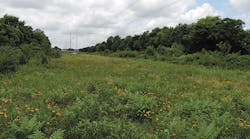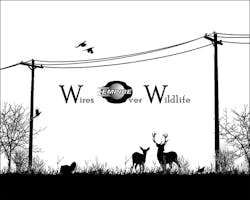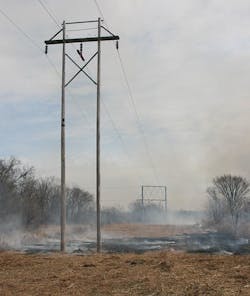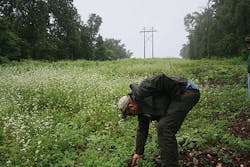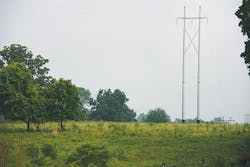Managing vegetation along rights-of-way (ROW) is an integral part of maintaining an electric system’s reliability. When a ROW is located on easements through tracts of private land, this management can be sensitive. Property owners acknowledge the utility’s right to maintain power lines, but they do not always agree with the methods used by the utility or the restrictions on their use of the property. At the same time, many professional conservationists and environmentally minded citizens are seeing more and more pressure on wildlife populations because of the increased growth and development.
The Empire District Electric Co. and the Missouri Department of Conservation (MDC) partnered on a newly implemented program to provide landowners with a creative solution that preserves and enhances wildlife habitat while maintaining the critical function of the utility easement. This program, appropriately called Wires Over Wildlife (WOW), encourages property owners to manage land for wildlife habitat where Empire easements are located under transmission lines and major distribution circuits. WOW is a cost-share program that reallocates maintenance funds for vegetation management to property owners in exchange for maintaining the ROW with a wildlife-oriented goal. Empire’s goal is to reduce maintenance needs while maintaining reliability and help property owners promote wildlife habitat on private lands.
Through the cost-share program, Empire reimburses property owners for some of the expense to convert the ROW into habitat for wildlife. The amount and type of assistance is unique to each site. With the funds, property owners can choose how best to spend the money on their project. The money can be used to purchase seed, maintenance equipment or fuel to run the equipment. The amount reimbursed is determined on the acreage and Empire’s cost to maintain the land. Goals for each project are usually staggered over multiple years to avoid overwhelming the property owner in the first year. However, once the heavy lifting is done, maintenance is typically minimal to achieve success.
Owner-Inspired Approach
Once a landowner indicates an interest in participating in the program, a member of Empire’s vegetation management department arranges an initial meeting at the property to determine if it meets the requirements of WOW. The requirements are relatively simple, all local, state and federal laws must be followed while implementing the management plan. Empire must be able to access the facilities to inspect or perform maintenance. The property owner is responsible for maintaining the ROW consistent with the management plan and removing undesirable vegetation that could grow into the power lines.
In addition, there are limits and size requirements to participate in the program. A minimum of three acres of ROW is preferred. The property must have overhead power lines and an existing easement. The program is intended for transmission ROW, but larger tracts containing distribution lines can be included if the sum of the ROW is close to 3 acres.
After qualification for landowner participation is established, discussion about what the landowner envisions for the property begins. The wildlife emphasis can address anything from pollinators to deer, or any combination of compatible species. A lot of Missouri’s game species have overlapping requirements so, when the land is improved for one species, multiple species often benefit. Many of the people interested in habitat enhancement projects are hunters wanting to improve their land for harvestable wildlife. The physical land enhancement can be as simple as a food plot for deer or as complicated as prescribed burns.
If the plan is complex or a landowner is unsure of what direction to go with the land, MDC private land consultants are called in to assist. They can provide technical counsel to the landowner on how to manage according to what wildlife the owner would like to attract. MDC’s technical expertise also helps the owner to decide what would be most suitable for the area. Maintenance of vegetation is an important consideration for the landowner, because an owner who signs up for the plan is responsible for implementing and completing the management plan.
Some landowners prefer to implement a complex, higher-maintenance plan while others may desire a simple approach. The plan typically involves multiple steps, over multiple years, yet the end goal is always the same: improved wildlife habitat, reduced maintenance needs for Empire and improved reliability for all of Empire’s customers.
MDC is pleased with the partnership. “We were tickled to death to have the opportunity to provide technical support and get more habitat development where the transmission lines run through private property,” said Mike Peterson, a private land consultant with MDC. “There’s a lot of potential to improve habitat in the state of Missouri with programs like this, and we are delighted to help Empire make this program a success.”
Customer Appeal
In the Ozark region of Missouri, the most popular goal to date has been the desire to attract wildlife for hunting. The rolling hills and dense oak forests provide great habitat for deer. One program participant in the WOW program is using this opportunity to help others.
Mike Robertson of Joplin, Missouri, has volunteered his portion of the ROW to provide land for disabled veterans to hunt. Recognizing that many veterans are unable to use facilities at traditional access areas or simply do not have access to a place to hunt, Robertson used a recent pole changeout project to repurpose old utility poles and fashioned them into handicapped-accessible deer blinds. In addition, Robertson has feathered the edge along the tree line, planted several food plots on the ROW and is managing the vegetation with prescribed burns. Robertson took his first disabled veteran hunting in 2015 and, although they did not harvest a deer, a great time was had by both.
Others just want to be able to attract wildlife for their own pleasure or feel it is the right thing to do. Rhea Ross of Granby, Missouri, was one of the program’s first participants and was interested initially in planting food plots for deer, but the food plots also attracted other wildlife.
“I’ve already begun to see deer, turkey and quail feed on the native grasses we planted last spring,” Ross said. “Last year, we were able to hunt dove off of the buckwheat we planted.”
Seeing dove on her property was a new addition to the ROW and expanded the WOW experience. Ross added, “We are very pleased with the results so far and can’t wait to expand the restoration area.”
When asked why she wanted to participate in this kind of program, she explained, “It is important to me to preserve the land and manage it in such a way to be of benefit to wildlife.”
Management Appeal
The WOW program has been not only a success with wildlife and property owners, but Empire is seeing benefits as well. “Everyone wins with Wires Over Wildlife,” explained John Donaldson, Empire’s director of system performance. “We can add valuable wildlife habitat on private lands while reducing costs associated with vegetation maintenance under these transmission lines. We are turning a typically unused area into a desirable attraction for our customers.”
Empire wins by reducing maintenance needs such as mowing, clearing and spraying of the ROW. Because the landowners are now responsible for that area, crews are able to skip those properties in the program and concentrate on other areas. Empire vegetation management staff makes annual routine site inspections to ensure guidelines of the program are being followed, which gives Empire an opportunity to meet face to face with customers.
“There isn’t a price tag that can be placed on the goodwill created when we work directly with our customers,” Donaldson added. “To genuinely be interested in them and to help them create something meaningful on their property creates a relationship and understanding that will last for years. Seeing the customers excited about the projects and seeing their success is very gratifying.”
The public relations benefit Empire has gained from this program is immeasurable. Concerned property owners now have another option to help manage their land for the power lines. Instead of Empire managing their land for them, they get to be a part of the solution and gain added benefit from their choice of the program goals. Through the WOW program, Empire has been able to mend some of its past relationships with property owners and strengthen others for the future while improving its system reliability through integrated vegetation management.
Utilities are no different than other companies in their desire to find cost-effective ways to better the environment. “We believe Wires Over Wildlife is a great program that supports natural resource conservation,” Donaldson said. “We are committed to being a good steward of the environment, and Wires Over Wildlife is one example of this dedication.”
WOW first began in Missouri in 2012 with a partnership between Ameren and MDC. With the program being in existence for a few years now, Empire has had the opportunity to learn from the success of others.
Empire kicked off its program in the summer of 2014 and currently has 10 participants. The utility estimates approximately 3,500 acres, or 30% of its transmission system, would be suitable for participation in WOW, so it looks forward to continuing to grow this valuable program.
Jason Grossman graduated from Oklahoma State University in 2005 with a bachelor’s degree in agricultural sciences and natural resources. He majored in environmental science with an emphasis on natural resource management. Grossman started working in utility forestry in 2006 as a contractor with Environmental Consultants Inc. He began his career at Empire District Electric Co. in 2008 as the distribution coordinator, later advancing to vegetation control coordinator for transmission in 2013. He is a founding member of the City of Joplin Tree Board, where he served as chairman from 2009 through 2013.
Missouri Department of Conservation
The Missouri Department of Conservation (MDC) has been protecting the state’s wildlife resources and helping citizens to connect with their natural heritage since 1937. MDC’s goal is to sustain diverse, healthy plant and animal communities.
MDC has many duties ranging from wildlife code enforcement to research and education, but one of its standout responsibilities is managing more than 975,000 acres located throughout the state for wildlife habitat, endangered plant and animal species protection, forestry and public use. While much of the land MDC manages is forested, the agency has honed its conservation skills for all types of wildlife habitat maintenance and enhancement, outdoor recreation, watershed protection, scenic beauty and forestry.
The agency partners with many landowners to help restore, improve and maintain Missouri forests, waters and wildlife habitat. MDC works with private landowners, conservation groups, agricultural organizations, communities and partners such as Empire District Electric Co. to advance its goal of protecting and enhancing Missouri’s natural environment.
For landowners with rights-of-way on their property, MDC has detailed plans available on a variety of topics:
•Watershed management, including streams, ponds, groundwater, wetlands, springs and sinkholes
• Deer management, including managing for balanced deer populations, deer hunting and health monitoring of the population
•Edge management for gamebird attraction
•Prairie, grassland and field improvement for wildlife, livestock, recreation, aesthetics and profitability
•Selecting and growing native plant species to enhance biodiversity
•Helping threatened plant species and addressing problem species.
MDC staff provides direct consultation to landowners in collaboration with Empire’s work, and the agency maintains a list of qualified conservation, habitat enhancement and ecological contractors that landowners may wish to use.
